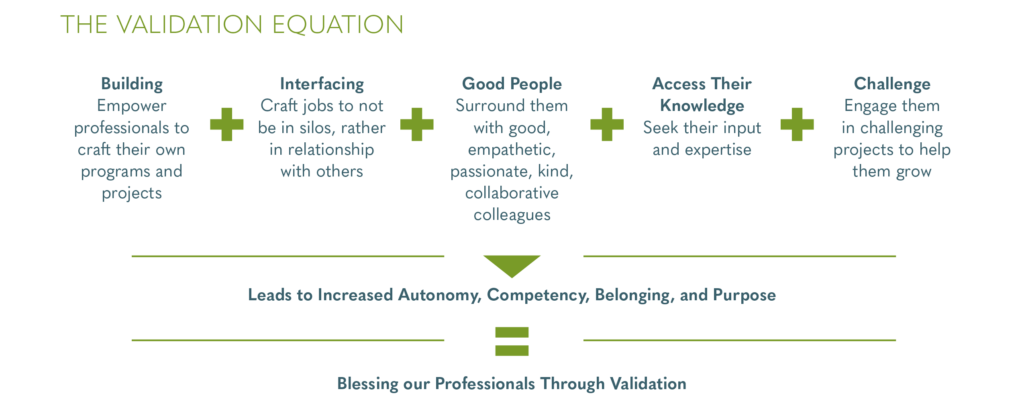
Prioritize our people through the power of meaningful appreciation. Utilize the idea of the emotional bank so our professionals feel validated, respected, and honored in their work.
Most Jewish community professionals are not looking for the limelight, but they do want to feel seen and heard, and they want their efforts validated. By taking some of our energized to make them feel their efforts are central to our broader success, it is wise to invest time in making it all about them, specifically thorough making use of the validation equation, the building blocks of which are:
- Building – Empower professionals to craft their own programs and projects, or to be creative and autonomous in the projects assigned to them
- Interfacing – Craft roles to not be in silos, rather, ensure their work is in relationship to other people both within and outside the organization.
- Good People – Surround our employees with good, empathetic, passionate, kind, and collaborative colleagues
- Access Their Knowledge – Make it a point to seek their input, increasing their feeling of competence and expertise
- Challenge – Engage them in challenging projects to help them grow.
These 5 Building Blocks together lead us to the Validation Equation – another avenue to reach the components of Edward Deci’s internal motivation that we introduced in Blessing One.

How We Make It All About Them:
Using the Emotional Bank Account
Popularized by Stephen Covey his best-seller, the 7 Habits of Highly Effective People, the emotional bank account works like a regular bank. One can make deposits or withdrawals. A deposit can be a thank you, a “you did a great job,” or any validation that signifies the importance of someone else’s role. Deposits make us feel that we matter and that others care. Of course, deposits have a transactional value as well. Our wealth of “us” with the other person rises, accumulates, and earns interest.
Therefore, when we need something – a favor, a “no worries” from the person after we apologize for a mistake, assistance with a project, or a request — they are willing, hopefully more than willing, to oblige. When we engage in these requests, we are making a withdrawal. The more deposits in their emotional piggy bank that we have, the more willing the individual will be to allow a withdrawal.

Depending on the nature of the withdrawal, as some deposits and withdrawals may weigh more than others, Covey suggests that we need at least 5 emotional deposits in one’s account before we make a withdrawal in order to keep the relationship strong and avoid resentment. As a transactional action, this makes sense, and in a transformational relationship it does too. Our stock in their eyes won’t go down because we have made so many sincere deposits.
Plan of Action:
- Have conversations with your staff and work towards incorporating each of the building blocks of the validation equation into their work experience.
- Take the actions that will increased deposits into their emotional bank account – asking them to take on meaningful projects, engage them in relationships, express your appreciation, provide them a meaningful and transparent compensation increase!
- Be sure to check in regularly with your staff. The validation equation and use of the emotional bank account is an on-going process – and needs continuous nurturing.
Our Portrait: Marc Fein

Marc Fein and I began our discussion debating whether it was a total accident or b’shert that Marc ended up in the professional roles he has been in thus far: primarily part-time or full-time youth director roles for Jewish teen youth groups. He has achieved success and been most comfortable in the Modern Orthodox space that he grew up and continues to practice within, steadily rising up the professional ladder with the National Conference of Jewish Youth (NCSY), the Modern Orthodox youth group movement. His initial thought was that his career path was an accident, but as we reflected together, he concluded that these roles suit and fulfill him, and he is becoming more OK with this career path being b’shert. (meant to be as it is).
Marc Fein is one of those exceptionally talented and inspirational individuals who is deeply connected to serving and inspiring the next generation and feeling privileged to do this work. Yet there have been times in his career in which he has felt a lack of meaningful validation.
Marc’s story can up us consider how we can get our employees to fill fueled for success, with a motivation and value that feels unlimited and over-flowing.
Questions for Reflection:
- How might we remove the pieces of our work cultures and surroundings that lead to unnecessary emotional withdrawals from our employees emotional bank accounts?
- How might we creating systems that naturally and continually add in emotional deposits?
- Where might their opportunities for us to instill rituals in our workplaces that allow for meaningful validation, respect, and honor of one’s work – both individually with our employees in a group staff setting?
